Lambert here: New Orleans, Detroit… I wonder which city’s next on the list?
By Julie Dermansky, a multimedia reporter and artist based in New Orleans. She is an affiliate scholar at Rutgers University’s Center for the Study of Genocide and Human Rights. Originally published at DeSmogBlog.
The scars of Hurricane Katrina in New Orleans that remain nine years later are a reminder of the city’s vulnerability to rising tides and storm surges. Both Katrina and Rita, a hurricane that followed just weeks later, washed away miles of coastal marshland, the state’s first line of defense from storms.
The landscape in Plaquemines Parish’s Braithwaite neighborhood is still that of a ghost town two years after Hurricane Isaac hit, underscoring the need to restore the coast.
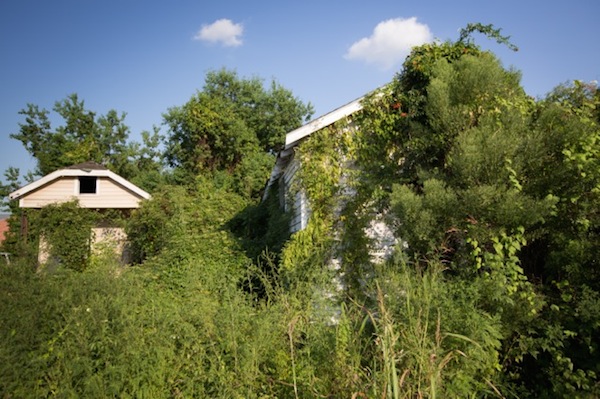
Blighted homes in New Orleans’ Lower 9th Ward on August 22. © 2014 Julie Dermansky
Home in Braithwaite, Louisiana destroyed by Hurricane Isaac. ©Julie Dermansky
The day after Hurricane Katrina’s nine-year anniversary on Friday, former Lt. General Russel Honoré and his Green Army held a commemorative breakfast. The army, a coalition of environmental and social justice groups, reflected on work they had done during the last legislative session and discussed their path forward. Saving Louisiana’s coast was on top of the agenda.
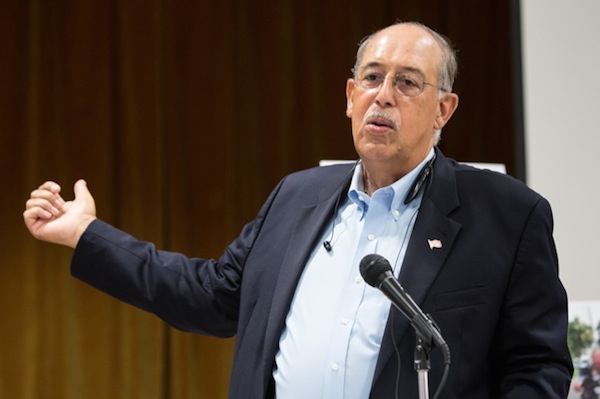
Former Lt. General Russel Honoré speaking at the Green Army Katrina Anniversary Commemorative Breakfast, held at Xavier University in New Orleans. ©2014 Julie Dermansky
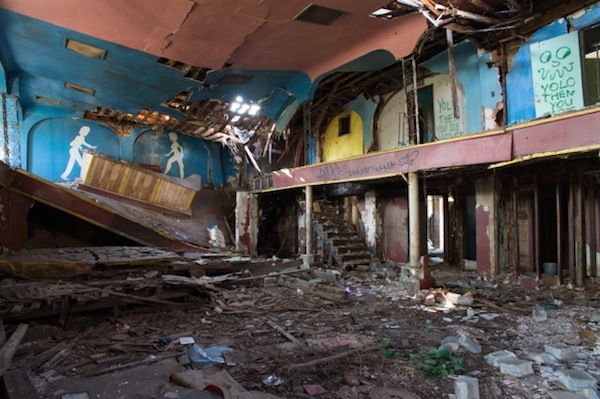
Interior of Club Desire in New Orleans’ 9th Ward. © 2014 Julie Dermansky
Louisiana is faced with dangers brought on by climate change, paired with coastal erosion accelerated by human activities including water diversion projects and damage done by the oil and gas industry.
There is a land loss on the Louisiana coast of approximately one football field every 38 minutes according to the Louisiana Department of Natural Resources. Their figures are based on numbers released by the United States Geological Survey.
“At current land loss rates, nearly 640,000 more acres, an area nearly the size of Rhode Island, will be under water by 2050,” The Louisiana agency says.
Plaquemines and Jefferson Parrish have waged multiple lawsuits against oil and gas companies alleging they broke the rules required in the permits allowing them to work in the wetlands, while others operated without permits at all, hastening coastal erosion.
The permits require the companies to restore the area they damaged to its original condition when work is complete — a condition overlooked for years by industry.
The lawsuits aim to recover funds needed to repair and restore the coast. The Parish lawsuits target individual companies citing specific wrongdoing, coinciding with the damage they allege was caused.
The Southeast Louisiana Flood Protection Authority-East (known as the levee board) waged its own lawsuit against the 97 oil and gas companies. They claim all of the companies contributed to damage to the coast that has weakened New Orleans’ flood protection.
Their suit follows the same argument: industry failed to restore the land they used to its original condition, as required by permits issued in order for them to do the work.
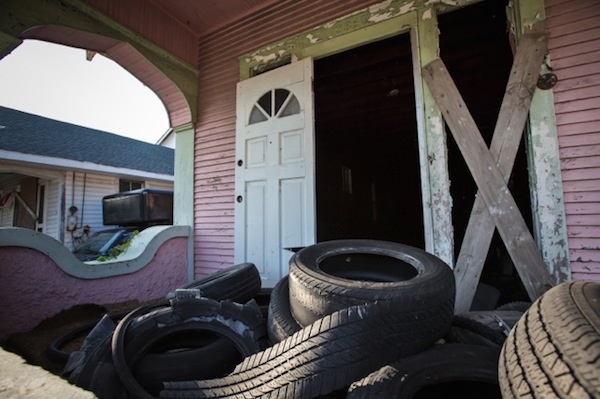
Blighted home in New Orleans’ 9th Ward with illegally dumped tires. ©2014 Julie Dermansky
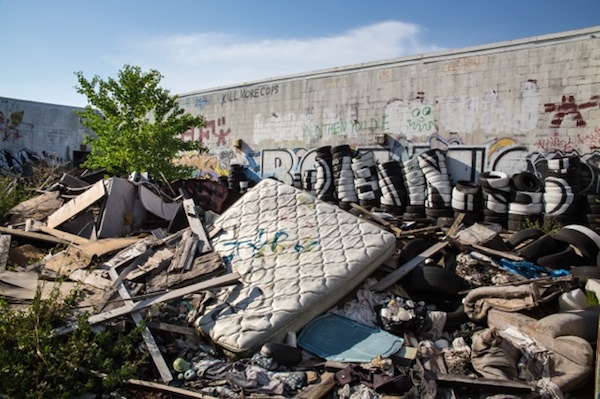
An illegal dump behind an abandoned building in New Orleans’ 9th Ward. ©2014 Julie Dermansky
None of the lawsuits try to hold industry responsible for all of the damage to the coast, just their share of the damages. What that amount is has not been clarified yet.
“Failing to restore oilfields that had been destroyed by the pits and canals that are a part of oil and gas extraction, and leaving polluted land and water in their wake, is against the law,” John Carmouche, one of the lead lawyers for the parishes, told the Baton Rouge Advocate.
“Enforcement of those regulations has been lax or non-existent, relying largely on self-reporting by the companies doing the work. The law is clear and the industry needs to be held accountable,” Carmouch said.
The Louisiana Oil and Gas Association has lobbied against all of the lawsuits, trying to get legislators to pass bills that will squash the lawsuits before they advance.
Louisiana Governor Bobby Jindal is openly opposed to the levee board suit, and signed SB 469 into law in June. The bill was written in an attempt to remove the levee board’s authority to sue the oil companies. It is “legislation that will help continue coastal restoration work and stop unnecessary, frivolous lawsuits,” according to Jindal’s website.
Before the bill passed, legal experts and Louisiana’s Attorney General Buddy Caldwell warned that, once singed into law, SB 469 could open the door for BP to challenge a number of lawsuits waged against the company by taking away many plaintiffs’ right to sue. After a four day delay, Jindal signed the law anyway.
Gov. Jindal’s brother, Nikesh Jindal, is an associate of Gibson, Dunn & Crutcher, a law firm representing BP, a fact exposed by Lamar White, Jr. in his blog, suggesting a major conflict of interest.
The lawyers representing the levee board don’t believe the new law can stop their suit. But the board is faced with another obstacle. Jindal has been stacking the board with members who are against the suit. After the next appointments are made, there is a chance the board will have enough members against the suit that they will call it off themselves.
Jindal started this process by not reappointing John Barry when his term was up. Barry, the former head of the levee board and a leading voice for the lawsuit, believes that if the oil and gas companies don’t pay for the damage they have done, there will not be enough money to protect the coast.
“Without the lawsuit, the demise of the coast is inevitable,” Barry told DeSmogBlog.
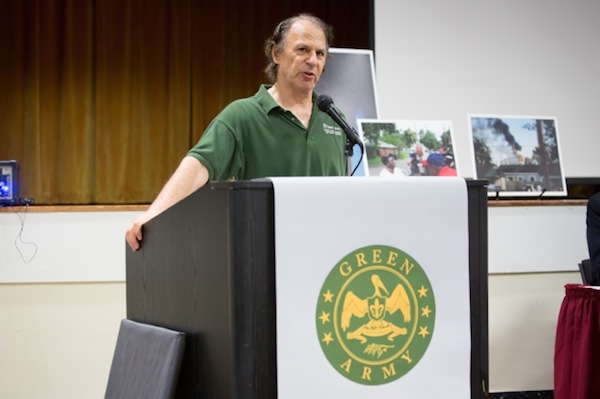
John Barry speaking at the Green Army Katrina Anniversary Commemorative Breakfast, held at Xavier University in New Orleans. ©2014 Julie Dermansky
At the commemorative breakfast, Barry pointed out, the oil and gas industry helped craft 19 bills to squash the levee board’s lawsuit and the Green Army managed to block 18 of them. The bill that did pass is unconstitutional and won’t hold up in court, the group says.
The estimated tab of Louisiana’s master coastal restoration plan, approved in 2012, is more than $50 billion over 50 years.
“Of that, about $1.2 billion is expected from a settlement with BP over the 2010 oil spill and a revenue-sharing bill will contribute some $600 million starting in 2017,” reported the National Journal.
So where will the missing money come from?
Billy Nungesser, Plaquemines Parish president, doesn’t see a problem with finding the money to restore the coast.
“Plaquemines Parish came up with their own plan that costs less than the state’s master plan,” he told DeSmogBlog.
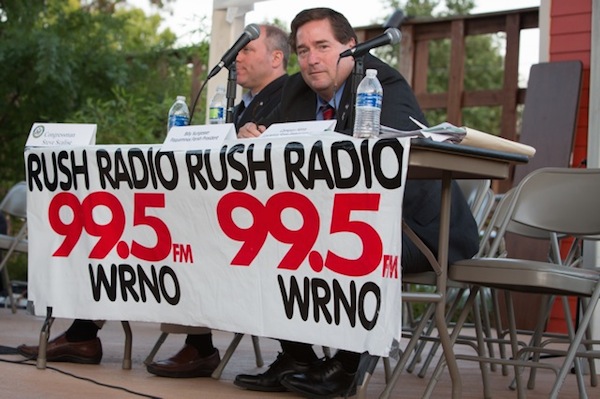
Billy Nungesser, Plaquimines Parish President next to Congressman Steve Scalise at a “town hall” meeting held by Rush Radio in Covington, Louisiana. ©2014 Julie Dermansky
“There would be enough money from BP to restore the coast. Nobody wins if we fight this out in court,” Nungesser says. “The biggest enemy is ridiculous litigation cost and politicians who want to spend the BP money on things other then coastal restoration.”
Nungesser is against all of the lawsuits, although he signed on to the ones where his parish is the plaintiff.
“The lawsuits are distracting,” he said. Nungesser believes industry is a good partner with the state. Though an outspoken critic of BP during the oil spill cleanup, Nunngesser has demurred.
“There is nothing we have asked the oil industry to do that they haven’t done,” Nungesser says. “We’ve got one chance at saving this coast,” he acknowledged, adding that, “We are going to get enough money from BP to begin the process — God help us if we don’t.”
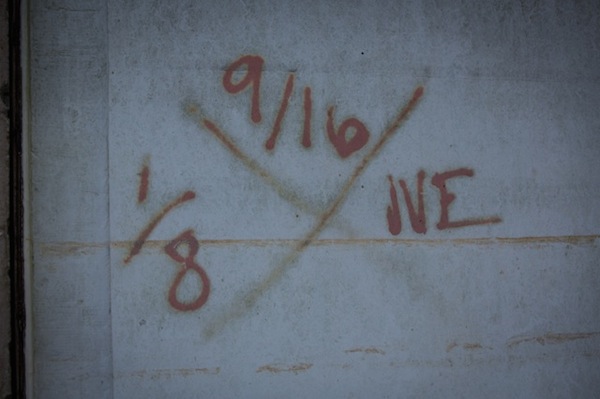
Marking left on a home by a rescue worker during Katrina’s aftermath in New Orleans’ Lower 9th Ward. ©201 4 Julie Dermansky
Yet BP has done a remarkable job not paying for the damage they caused following the 2010 spill. They filed a petition to the U.S. Supreme Court against a lower New Orleans court’s settlement they helped craft.
The latest setback to victims of the spill came when a judge ruled in favor of BP in an interpretation of medical settlement payments. Those not diagnosed before 2012 by a doctor are not able to qualify for what is called “Specified Physical Condition” payments.
Their cases now fall under “later-manifested” cases and will be heard after the main cases are settled, adding years to the time those victims might receive compensation.
If there is not major coastal restoration soon, all of the city’s natural protection will be gone.
Satellite images illustrate the damage done over the last 30 years. New Orleans stands to become beachfront property with little chance of surviving as climate change accelerates.
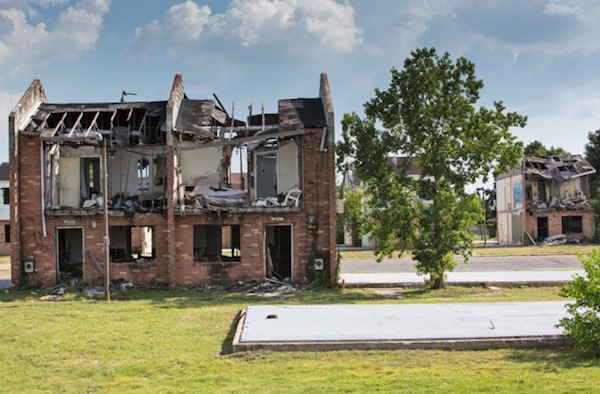
Blighted structures in Press Park, a public housing project in New Orleans’ 9th Ward built on top of a Superfund site. © 2014 Julie Dermansky
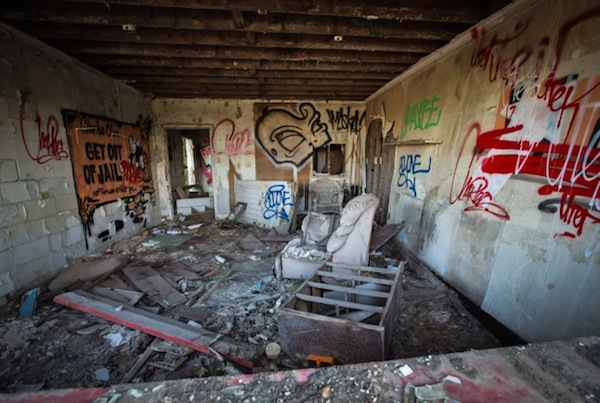
Blighted commercial space in New Orleans’ Lower 9th Ward. © 2014 Julie Dermansky
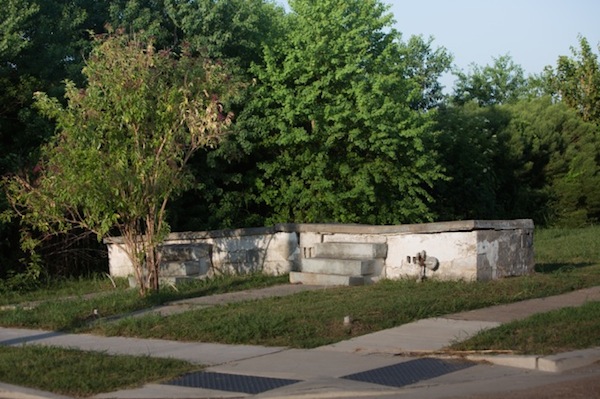
Part of the foundation of a home in New Orleans’ Lower 9th Ward. ©2014 Julie Dermansky
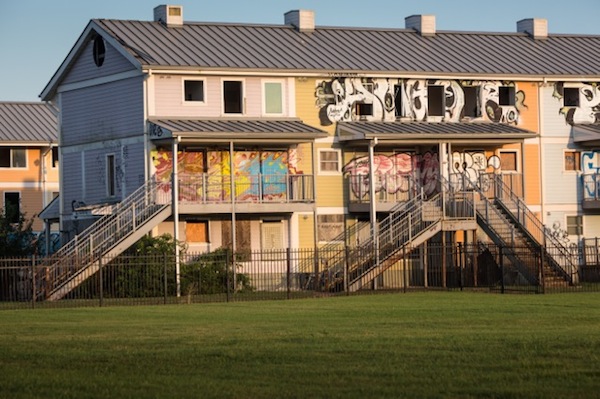
Blighted public housing development left in ruins since Katrina in New Orleans’ 9th Ward. © 2014 Julie Dermansky
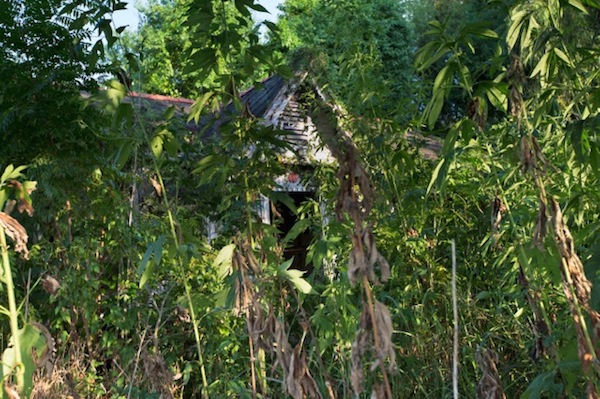
Blighted home in New Orleans’ Lower 9th Ward. ©2014 Julie Dermansky
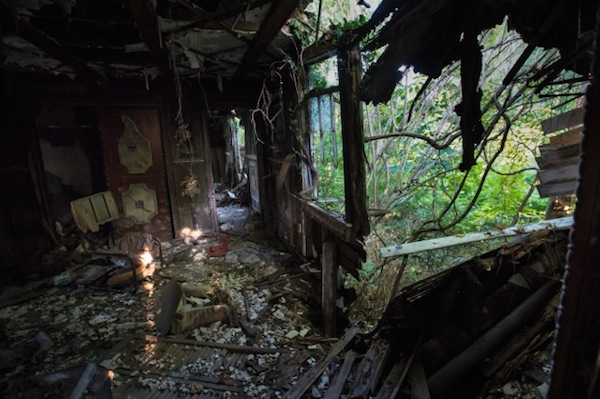
Blighted home in New Orleans’ Lower 9th Ward. ©2014 Julie Dermansky
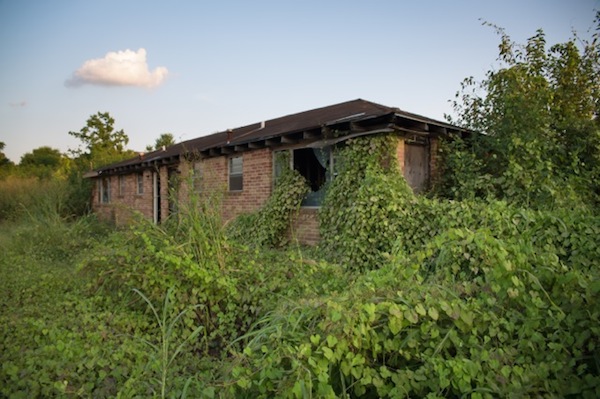
Blighted home in New Orleans’ Lower 9th Ward. ©2014 Julie Dermansky
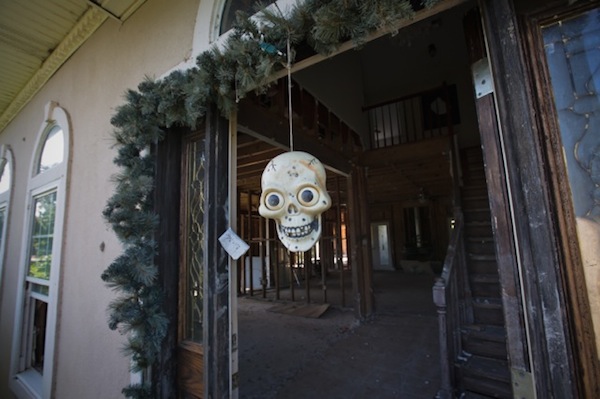


Plenty of money for neutron-beam cannons to kill people across the globe, new ways to spy on US citizens, new ways to legislate profits for corporations, abandoned billion-dollar embassies in Afghanistan…nuthin’ left to take care of the place.
Step 1: Put down TV clicker; Step 2 Arise from couch; Step 3 Aux barricades!
An odd post. Odd because some of the images don’t reflect the content of the discussion and fails to discuss the victims of the blighted homes. The crux of the blighted homes is the 800lb gorilla in the room: The US government’s successful beat back of the lawsuits against the Army Corp of Engineers to compensate the black victims of the levee breach during Katrina, inspite of GWB’s empty promises. Local authorities also won because they don’t want those blacks folks back in there. Pretty ugly.
As for the discussion, the issue is how does Louisiana improve the capacity to assess and adapt to climate change? Clearly, Louisiana political governance is ground zero for nut cases. They are not interested in having companies pay for damages they caused.
What I would do is get the townspeople who are concerned about it to petition the UN to certify the area as a UNESCO heritage site in order that it get broader attention. Jindal and his criminal friends belong on another planet so others can attempt to preserve what’s left.
“Lambert here: New Orleans, Detroit… I wonder which city’s next on the list?”
Chicago comes to mind. City leadership with their infinite wisdom shut down a ton of public schools primarily in black neighborhoods to aggravate them. Ferguson too. City planners have put the black population under debtors prison in clear violation of the Constitution. A bit of research could reveal a lot more similar situations around the country.
A bit of Louisiana natural history from John McPhee:
The Mississippi River, with its sand and silt, has created most of Louisiana, and it could not have done so by remaining in one channel. If it had, southern Louisiana would be a long narrow peninsula reaching into the Gulf of Mexico. Southern Louisiana exists in its present form because the Mississippi River has jumped here and there within an arc about two hundred miles wide, like a pianist playing with one hand.
But in the interval since the last shift Europeans had settled beside the river, a nation had developed, and the nation could not afford nature. The consequences of the Atchafalaya’s conquest of the Mississippi would include but not be limited to the demise of Baton Rouge and the virtual destruction of New Orleans.
Coming in from the northwest, from Texas via Shreveport, the Red River had been a tributary of the Mississippi for a couple of thousand years—until the nineteen-forties, when the Atchafalaya captured it and drew it away. The United States Congress, in its deliberations, decided that “the distribution of flow and sediment in the Mississippi and Atchafalaya Rivers is now in desirable proportions and should be so maintained.” The Corps was thereby ordered to preserve 1950. In perpetuity, at Old River, thirty per cent of the latitude flow was to pass to the Atchafalaya.
In 1980 a study published by the Water Resources Research Institute, at Louisiana State University, described Old River as “the scene of a direct confrontation between the United States Government and the Mississippi River.”
http://www.newyorker.com/magazine/1987/02/23/atchafalaya
————
About time to bring up Mother Nature on contempt of Congress charges, ain’t it?
The Katrina moment is one of the critical milestones in American history. Like the stolen elections of 2000 and 2004 Katrina was the final period of the old Constitutional Republic because it signaled the end of the old social contract and the complete change of culture. Americans for all their warts and violent episodes have always had an element of cooperation and neighborly assistance as old timers will tell you. Katrina presented us with a situation where the heart-felt compassion of many was deliberately suppressed by the National Security State and an official regime of cruelty was instituted. In every way Katrina showed the fangs behind the smile of government. New Orleans is our collective future and every major trend and event has reflected that from the deliberately created financial crisis to the rise of ISIS and the revival of the Cold War for Orwellian purposes–the Katrina event showed us the emergent reality we will all face. This is why I refuse to follow the progressive idea that government can be a force for positive change as it was portrayed in the Grapes of Wrath. That sort of federal government is not possible anymore And state governments are rarely any better.
Government can be a force for whatever kind of change wanted by the organized people in possession of that Government. If positive changers become numerous, mean, intelligent, organized and unforgiving enough to be able to reconquer government from the negative changers and use it for positive change, it can be a positive change tool.
Elite governators who work to stop certain kinds and grouploads of people from voting must not entirely trust the saying: if voting could change things, they would make it illegal.
About Katrina, Jeff Wells at Rigorous Intuition 2.0 has a whole section of articles about Katrina and its various aspects. I won’t try leaving a link any more because there is some kind of digital histo-incompatibility between this blog and my workplace computers. Any time I try including a link the program freezes right up and death-stills this blog on my screen here at work. (And its not my computer so I don’t dare go messing around inside it even if I knew how.)
New Orleans is one of the most unique, culturally/physically, cities in the world. The shame of Jindal and other politicians – local and national – to not make NOLA whole again is despicable. Having been to NO both before and after this tragedy, I am aghast at the lack of progress to restore this unique bastion of culture, music and spirit. Shame.
Thanks for this article/photos to all concerned.
For more Info On Katrina/BP/oil Companies/George Bush and their refusal to do anything about the Oil Route
That lead to the Ninth Ward…..See The Greg Palst book VULTURES PICNIC.
Also see Greg Palast site http://www.gregpalast.com
Lap Dancers, the CIA, Pay-offs, and BP’s Deepwater Horizon
ALSO SEE Crime Scene – New Orleans
By Greg Palast for Reader Supported News
http://www.gregpalast.com below…..
[Lower Ninth Ward, New Orleans] Nine years ago this week, New Orleans drowned. Don’t you dare blame Mother Nature. Miss Katrina killed no one in this town. But it was a homicide, with nearly 2,000 dead victims. If not Katrina, who done it? Read on.
All prayers and thoughts go to the people who died in the ninth ward district.
and the people from there,who continue to suffer..
words are not enough…..thanks.